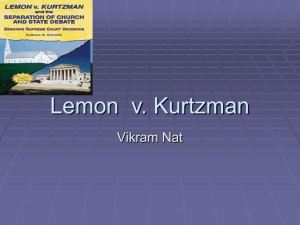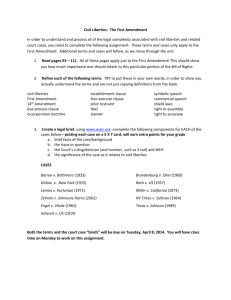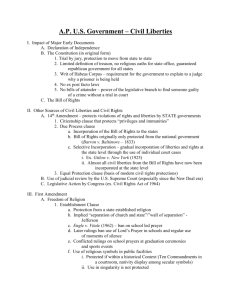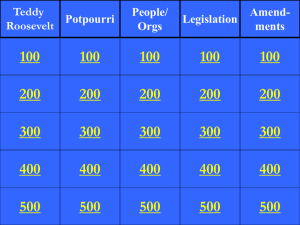Chapter 4 Civil Liberties
advertisement
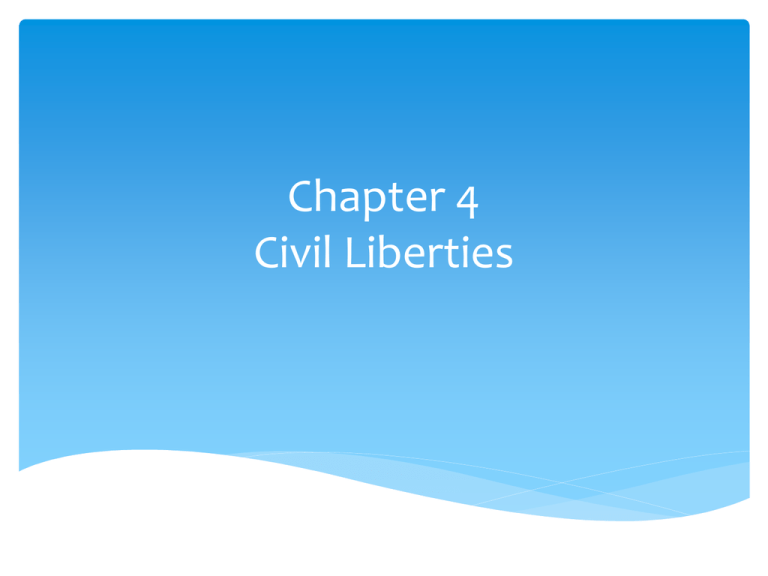
Chapter 4 Civil Liberties Thursday’s Reading Pages 93 - 102 1.) FOUR liberties in 1st Amendment Freedom of press, speech, religion and assembly 2.) States abiding by Bill of Rights Don’t need to write all this… “No State shall make or enforce any law which shall abridge the privileges or immunities of citizens of the United States” (14th Amendment) This amendment NATIONALIZES the Bill of Rights 3.) Religious Rights (2 types) Establishment Clause – Congress can’t make laws establishing a religion Free exercise Clause – prohibits the abridgement (restriction) of citizens’ freedom to worship OR not worship as they please 4.) Lemon v. Kurtzman Dealing with aid (money) to church-related schools Must do the following: “Lemon Test” a.) Have a secular purpose b.) Have a primary effect that neither advances nor inhibits religion c.) Not foster an excessive government “entanglement” with religion 5.) Complications to Free Exercise Religion sometimes forbid actions that society thinks are necessary; OR religions may require actions that society finds unacceptable. multiple marriages use of illegal drugs resist military service Amish sending students to public schools More examples?? Multiple Choice Please refer to your student notes Question 1 Question 2 Question 3 Friday’s Reading Pages 102 - 112 1.) Prior Restraint Definition: CENSORSHIP Gov’t preventing material from being published Case protecting newspapers from censorship Near v. Minnesota Newspaper created a list of public officials – calling them gangsters, corrupt, etc. 2.) Change in free speech Peace and wartime! Clear and present danger rule (Schenck case) – speech limited Smith Act 1940 – protecting nat’l security outweighed 1st Amendment After 1960s protest – speech more “free” when discussing war 3.) Obscenity!!! NOT protected according to Roth v. United States 4.) Winner of libel cases?? The person WRITING the negative words!!! Right to have the ability to criticize public officials Don’t want to bring attention to themselves 5.) Symbolic Speech Burning a flag Wearing armbands to protest war Marching in a parade Actions not requiring speaking or writing Other ideas?? 6.) Restrictions on Press S.C. has NEVER restricted access to trials 1st Amendment entitles press to cover every trial 7.) Commercial Speech Communication in the form of advertising Can be restricted more than any other speech WHY?? 8.) Miami Herald and Red Lion Cases Federal Communications Commission regulates content of radio and t.v. broadcasting Miami Herald – a state could NOT force a newspaper to print replies from candidates it had criticized Red Lion – court upheld restrictions on radio and t.v. Restrictions tighter on those mediums b/c there are less options available than print media Will probably never see these cases on exam – just be aware of the FCC involvement 9.) Right to Assemble Time, place and manner restrictions Get a permit with local/city gov’t Permission granted IF “time and place” allows the police to prevent major disruptions Virtually NO restrictions on the content of group’s message Good or bad?? 10.) Right to Associate PART of freedom of assembly Ability to associate with people who share a common interest NAACP v. Alabama State wanted names of NAACP members Court found demand unconstitutional Multiple Choice Question 1 Question 2

